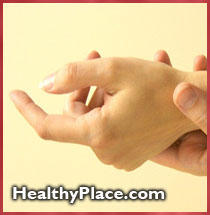Narcissism in the Workplace
Online Conference Transcript


Our guest, Dr. Sam Vaknin, has a Ph.D. in philosophy and is the author of the book Malignant Self Love - Narcissism Revisited. We discussed various aspects of narcissism in the workplace, including how to recognize a narcissist, what personality types can work with a narcissist and how to cope with a narcissistic employer.
David Roberts is the HealthyPlace.com moderator.
The people in blue are audience members.
David: Good Evening. I hope your day went well. Welcome to HealthyPlace.com and our chat conference on "Narcissism in the Workplace." I'm David Roberts, the moderator of tonight's chat. Some of the topics we'll be discussing include: How to cope with a narcissistic boss, co-worker, supplier, colleague, partner, competitor, manager, or employee. And when is it time to toss in the towel and leave that troublesome job?
Our guest is Dr. Sam Vaknin, author of Malignant Self Love: Narcissism Revisited and an authority on the subject of narcissism. You can read more about Dr. Vaknin by clicking on the link.
Just to clarify, Dr. Vaknin is not a therapist or medical doctor of any sort. However, he is an expert on the subject of narcissism and a self-proclaimed narcissist. Good Evening Dr. Vaknin and welcome to HealthyPlace.com. Just so we are all clear on the subject, can you give us a brief overview of what narcissism is?
Dr. Vaknin: Great to be here again. Thank you for having me and for the kind words. Hello, everyone.
Narcissists are driven by the need to uphold and maintain a false self. They use the False Self to garner narcissistic supply which is any kind of attention adulation, admiration, or even notoriety and infamy.
David: How does one recognize a narcissist?
Dr. Vaknin: It is close to impossible and that is the secret of their astounding success. Narcissists are good actors. They are adept at charming others, persuading them, manipulating them, or otherwise influencing them to do their bidding. The narcissist's sense of self-worth is unstable (labile) so, the narcissist relies on input from other people to regulate his self-esteem and self-confidence. He focuses on potential sources of supply and engulfs them with focused attention and simulated deep emotions. Only in a later encounter, as time passes and the number of interactions grows, is it possible to tell that someone is a narcissist. Narcissists are preoccupied with grandiose fantasies unrealistic plans. They are poor judges of reality. They are bullies and often resort to verbal and emotional abuse. They exploit people and then discard them. They have no empathy and regard their co-workers as mere instruments objects, tools, and sources of adulation, affirmation, or potential benefits.
David: So, in the beginning, you are saying they will get on your good side by charming you and pretending to be interested in you and what you're doing. Later, what kind of behaviors should a person expect from the: (1) narcissistic boss and (2) colleague? And I'm assuming here that the behaviors for the two might be different.
Dr. Vaknin: Workplace narcissists seethe with anger and resentment. The gap between reality and their grandiose flights of fancy (the "grandiosity gap") is so great that they develop persecutory delusions, resentment, and rage. They are also extremely and pathologically envious, seeking to destroy what they perceive to be the sources of their constant frustration: a popular co-worker, a successful boss, a qualified or skilled employee. Narcissists at work crave constant attention and will go to great lengths to secure it - including by "engineering" situations that place them at the center. They are immature, constantly nagging and complaining, finding fault with everyone and everything, Cassandras who constantly predict impending doom. They are intrusive and invasive. They firmly believe in their own omnipotence and omniscience. They feel entitled to special treatment and are convinced that they are above Man-made laws, including the rules of their place of employment. They are very disruptive, poor team members, can rarely collaborate with others without being cantankerous and quarrelsome. They are control freaks and feel the compulsive and irresistible urge to interfere in everything to micromanage and overrule others. All in all, a highly unpleasant experience.
David: If you work with or under a narcissist, it sounds like your work life might be a living hell.
Dr. Vaknin: You would never forget it. It is traumatic and very likely to end in actual bullying and stalking behaviors. Many workers end up with PTSD - Post Traumatic Stress Syndrome. Others quit, or even relocate.
David: What kind of individual, personality-wise, is best suited to work with a narcissist co-worker or boss?
Dr. Vaknin: Certain pathological personalities - for instance, someone with a Dependent Personality Disorder - or an Inverted Narcissist may get along just fine. A submissive person whose expectations are limited, moods are subdued and willingness to absorb abuse is extended would survive with a narcissist, or even thrive in such an environment. But the vast majority of workers are likely to suffer ill-health effects, clash with the narcissist, or end up being sacked, reassigned, relocated, or demoted. The narcissistic bully very often gets his way: He gets promoted, the ideas he "adopted" become corporate policy, his misdeeds are overlooked, his misbehavior tolerated. This is partly because, as I said earlier, narcissists are excellent liars with considerable thespian skills - and partly because no one wants to mess around with a thug, even if his thuggery is limited to words and gestures.
David: We have a lot of audience questions, Dr. Vaknin. Let's get to a few and then I have a few more questions to ask you. Here's the first one:
AMichael: How common is narcissism within the population?
Dr. Vaknin: According to orthodoxy, between 0.7%-1% of the adult population suffer from Narcissistic Personality Disorder. This figure is an underestimate. Pathological narcissism is under-reported because, by definition, few narcissists admit that anything is wrong with them and that they may be the source of the constant problem in their life and the lives of their nearest or dearest. Narcissists resort to therapy only in the wake of a harrowing life crisis. They have alloplastic defenses - they tend to blame the world, their boss, society, God, their spouse for their misfortune and failures. Last, but not least, psychotherapists regard narcissists as "difficult" patients with a "severe" personality disorder - or, put plainly, lots of work with little reward. Narcissists, Paranoiacs and Psychotherapists Narcissistic Personality Disorder (NPD) At a Glance.
Doria57: Is there any way to get along with these type of people at work?
Dr. Vaknin: Here are a few useful guidelines:
- Never disagree with the narcissist or contradict him.
- Never offer him any intimacy. You are not his equal and an offer of intimacy insultingly implies that you are.
- Look awed by whatever attribute matters to him (for instance: by his professional achievements or by his good looks, or by his success with women and so on).
- Never remind him of life outside his bubble and if you do, connect it somehow to his sense of grandiosity. Do not make any comment, which might directly or indirectly impinge on his self-image, omnipotence, judgment, omniscience, skills, capabilities, professional record, or even omnipresence.
- Bad sentences start with: "I think you overlooked & made a mistake here & you don't know & do you know & you were not here yesterday so & you cannot & you should, etc. These are perceived as a rude imposition. Narcissists react very badly to restrictions placed on their freedom.
Linda3003: My husband is employed by a very large university, in spite of "outstanding" appraisals, many stolen ideas, marked increase in customer satisfaction and being very professional, he was recently fired. His boss did not like the accolades my husband was receiving, etc. How does one combat the defamation?
Dr. Vaknin: Depends on your resources and your ability to accept recurrent interim defeats. Narcissistic bosses are very tenacious and resourceful. They are pillars of the community, usually widely respected and believed. They have at their disposal the entire wherewithal of the organization. People say "where there's fire, there's smoke". "If he was fired, there must have been a good reason for it", "Why couldn't he simply get along? He must be egocentric, a bad team player." And so on. It is an uphill battle. My advice to you is to team up with an anti-bullying group or to have an attorney look into wrongful dismissal charges.
freedom03: I would like to know if the narcissist is aware of what they are doing?
Dr. Vaknin: Aware, cunning, premeditated, and, sometimes, even enjoying every bit of it. But it is not malice that drives them. They believe in their own destiny, superiority, entitlement, exemption from laws promulgated by mere mortals. The narcissist regards himself as one would an expensive present, a gift to his company, to his family, to his neighbours, to his colleagues, to his country. Resistance calls for strenuous measures. Disagreement with the narcissist is bound to be the outcome of ignorance or obstructionism. Criticism is malevolent and ill-founded. The narcissist trusts that he has the full moral justification to battle his foes. To his mind, the world is a hostile place, full of Lilliputians who seek to shackle his genius, foresight, and natural advantages. They aim to harness and castrate - and they deserve his ire and the ensuing punishment he metes out to them in his infinite wisdom. It is a crusade against the injustice of not recognizing the narcissist's true place in this world - at the pinnacle.
David: Dr. Vaknin, earlier you mention that the narcissist would act empathetic to draw in his prey, so to speak. In light of that, here's the next question:
martha j: Can this person genuinely develop authentic empathy skills?
Dr. Vaknin: No, he cannot. Narcissists lack the basic machinery of putting themselves in other people's shoes. They react with fury and denial when confronted with the fact that persons in their environments are individual entities with their own idiosyncratic and specific needs, preferences, choices, fears, hopes, and expectations. This, the refusal to grant autonomy, is at the core of abuse, whether on the domestic front or at the workplace. To the narcissist, others are mere extensions, instruments of gratification, sources of narcissistic supply. And nothing more than that.
delaware1974: With so many people afflicted with this - why are we making it sound like a death sentence? All of us still need to move on with our lives ...are we supposed to give up and accept because it's hard? We spend a lot of time talking about the negative or "escaping" the narcissist, "surviving" the narcissist, what about those of us that want to help them and NOT give up on them? Are there LIVE face-to-face help groups? Hope?
Dr. Vaknin: It is possible to live with the narcissist, as I made clear earlier. It requires certain behavioral modifications and a willingness to accept the narcissist largely as he is. These may be of interest:
- The Inverted Narcissist - FAQ#66
- Treatment Modailties and Psychotherapies - FAQ #77
- The Reconditioned Narcissist - FAQ#63
- Narcissists, Paranoiacs and Psychotherapists - FAQs#26-27
- Narcissist Employer
David: For many people, Dr. Vaknin, if you are in a situation working with a narcissist or under a narcissist, they can't just pick up and leave their job. What is the best way for them to cope without "kissing" up to this person and being always vigilant about what you say and how you say it? or is that the only way to survive?
Dr. Vaknin: It depends whether the narcissistic bully represents the corporate culture of the workplace - or is an isolated case attributable to a quirky nature or a personality disorder. Alas, very often, abusive behaviors in one's office or shop floor are merely the epitome of all-pervasive wrongdoing which permeates the entire hierarchy, from top management to the bottom rung of employment. Bullies rarely dare to express their tendencies in isolation and in defiance of the prevailing ethos. Or, if they do run against the grain of their place of employment, they lose their jobs. Typically, narcissists join already narcissistic firms and mesh well with a toxic workplace, a poisonous atmosphere, and abusive management. If one is not willing to succumb to the mores and (lack of) ethics of the workplace, there is little one can do. Surprisingly few countries (Sweden, the United Kingdom, to some extent) outlaw workplace abuse specifically. Whistleblowers and "troublemakers" are frowned upon and are not protected by any institutions. It is a dismal landscape. The victim would do well to simply resign and move on, sad as this may be. As awareness of the phenomenon increases and laws take effect, hopefully, this will change and bullied and abused workers will find effective ways to cope with mistreatment.
TimeToFly: What typically happens to a narcissist when they lose their position of authority or their job. How do they react to that? My narcissist ex-husband recently lost his job. He will not say what happened exactly, typical. But since then he has been on a rampage to destroy me. It was right after the loss of his previous job that he left me and our children 4 years ago. He had been the manager of engineering and was first demoted, and then finally left the company. I never did get the story. He has just remarried, but his new life somehow has not distracted him from his obsession with destroying mine.
Dr. Vaknin: Being demoted or losing one's job is a narcissistic injury (or wound). The entire edifice of the Narcissistic Personality Disorder is an elaborate and multi-layered reaction to past narcissistic injuries. A gap opens between the way the narcissistic imagines himself to be (grandiosity) and reality (unemployed, humiliated, discarded, unneeded). The narcissist strives to bridge the grandiosity gap but sometimes it is simply to abysmal to deny or ignore. So, some narcissists go through decompensation - their defense mechanisms crumble. They may even experience brief psychotic episodes. They become dysfunctional. The narcissists redouble their efforts to obtain narcissistic supply by any means - sex, exercise, attention-seeking behaviors. Yet others withdraw altogether to "lick their wounds" (schizoid posture). What is common to all these narcissists is the ominous feeling that they are losing control (and maybe even losing it). In a desparate effort to re-exert control, the narcissist becomes abusive. Sometimes abuse is about controlling the victim. Others seek "easy targets" - lonely women to "conquer" or simple tasks to accomplish, or no-brainers, or to compete against weak opponents with a guaranteed result.
For more on these behaviors:
David: If you are interested in purchasing Dr. Vaknin's excellent and very thorough book on narcissism, Malignant Self Love: Narcissism Revisited, click on the link.
jenmosaic: What causes NPD?
Dr. Vaknin: No one knows. The accepted wisdom is that NPD is tan adaptative reaction to early childhood or early adolescence trauma and abuse. There are many forms of abuse. The more familiar ones - verbal, emotional, psychological, physical, sexual - of course yield psychopathologies. But are far more subtle and more insidious forms of mistreatment. Doting, smothering, ignoring personal boundaries, treating someone as an extension or a wish-fulfillment machine, spoiling, emotional blackmail, an ambience of paranoia or intimidation ("gaslighting") - have as long lasting effects as the "classic" varieties of abuse. Still, there is always the possibility of a hereditary component More about the roots of narcissism here
David: Here are a couple of audience comments about what's been said tonight:
Doria57: No one ever wants to form an anti-bullying group, they are afraid.
martha j: The descriptions of the narcissistic boss --Isn't this the unfortunate all American definition of the "successful" boss?
Dr. Vaknin: I'd like to respond to that last comment. Mental health disorders - and especially personality disorders - are not divorced from the twin contexts of culture and society. Western society and culture are narcissistic. Disparate scholars and thinkers - Christopher Lasch on the one hand and Theodore Millon on the other hand - have concluded as much. Narcissistic behaviors - now labeled "misconduct" - have long been normative. The basically narcissistic traits of individualism competitiveness, unbridled ambition - are the founding stones of certain versions of capitalism. Thus, certain forms of abuse and bullying actually constitute an integral part of the folklore of corporate America. Narcissistic bosses were idolized. As long as this is the case, workplace abuse would be hard to overcome. More here:
David: Thank you, Dr. Vaknin, for being our guest this evening and for sharing this information with us. And to those in the audience, thank you for coming and participating. I hope you found it helpful. We have a very large and active community here at HealthyPlace.com. Also, if you found our site beneficial, I hope you'll pass our URL around to your friends, mail list buddies, and others. http://www.healthyplace.com
Disclaimer: We are not recommending or endorsing any of the suggestions of our guest. In fact, we strongly encourage you to talk over any therapies, remedies or suggestions with your doctor BEFORE you implement them or make any changes in your treatment.
APA Reference
Vaknin, S.
(2007, April 18). Narcissism in the Workplace, HealthyPlace. Retrieved
on 2026, January 1 from https://www.healthyplace.com/personality-disorders/transcripts/narcissism-in-the-workplace


 Psychologist,
Psychologist, 






